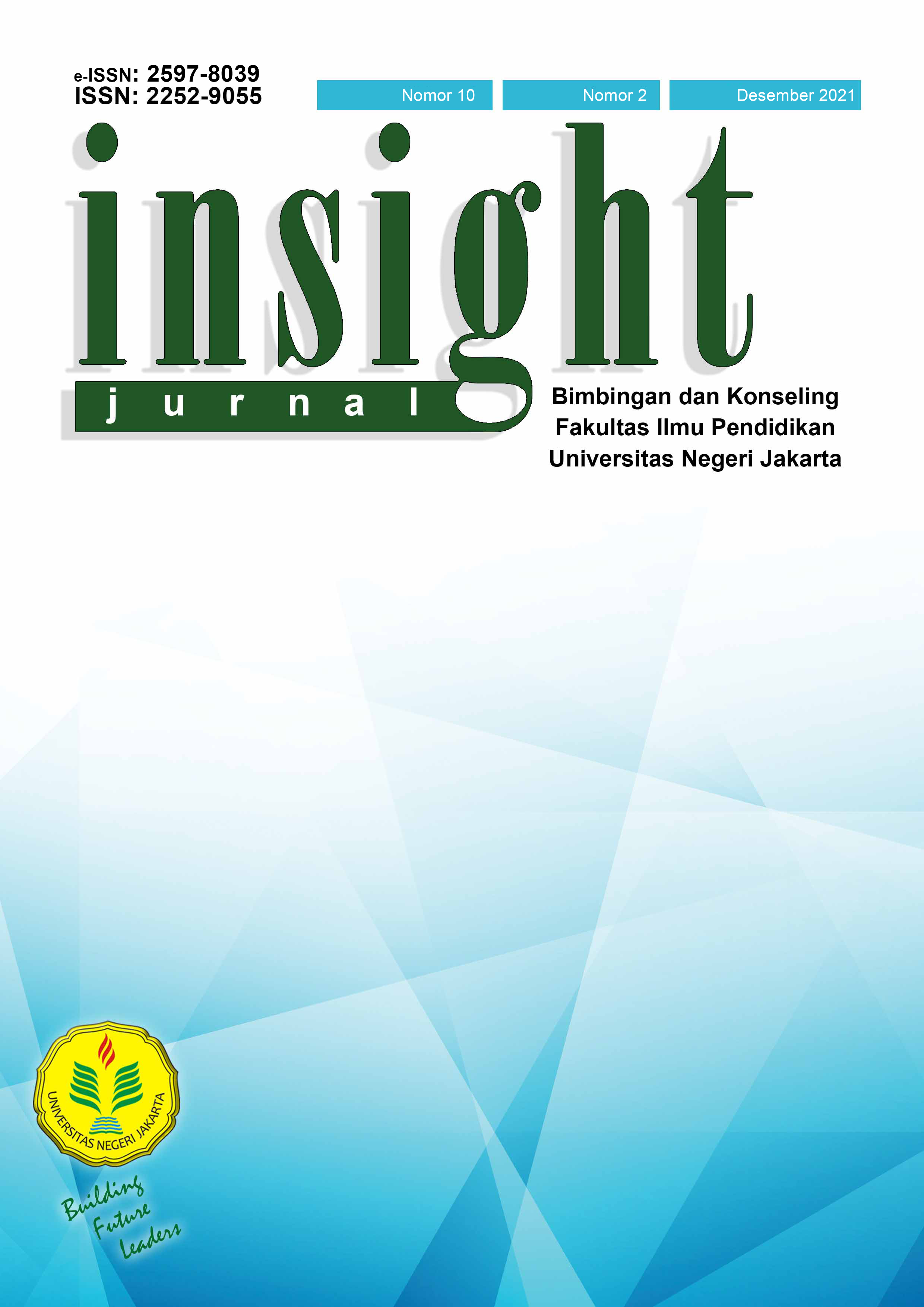Konstruksi Karier pada Biseksual: Studi Kasus
DOI:
https://doi.org/10.21009/INSIGHT.102.02Keywords:
konseling kunstruksi karier, career construction interview (CCI), biseksualAbstract
Penelitian ini melaporkan efektivitas konseling konstruksi karier dengan seorang biseksual. Klien dipilih secara purposive, dengan kriteria seleksi seorang wanita biseksual muda dewasa yang sedang mencari pekerjaan dan cakap dalam bercerita. Intervensi melibatkan administrasi wawancara Career Construction Interview (CCI) untuk pembentukan potret kehidupan melalui narasi yang diceritakan klien. Desain penelitian berupa kualitatif paradigma interpretatif. CCI diberikan untuk mengumpulkan data kualitatif dibantu dengan strategi delapan langkah Savickas untuk melengkapi data. Penelitian memiliki banyak kekurangan, sehingga pembentukan potret kehidupan tidak dilakukan secara maksimal sebab data yang diperoleh tidak mencukupi. Namun, setelah intervensi klien menunjukkan pemahaman baru tentang dirinya yang sangat dipengaruhi oleh emosi sang Ibu, sehingga proses konseling berhasil membuat klien membentuk rencana langkah-langkah perbaikan.
References
Briddick, W. ., Sensoy-Briddick, H., & Savickas, S. (2018). Career construction materials: the story of a career development curriculum in a Turkish school. Early Child Development and Care, 1–12.
Cahyawulan, W. (2017). Konseling Karier Life Design : Analisis Konten Jurnal The Career Development Quarterly. Seminar Dan LokakaryaNasional Revitilisasi Laboratorium Dan Jurnal Ilmiah Dalam Implementasi Kurikulum Bimbingan Dan Konseling, 282–290.
Datti, P. A. (2009). Applying Social Learning Theory of Career Decision Making to Gay, Lesbian, Bisexual, Transgender, and Questioning Young Adults. Career Development Quarterly, 58(1), 54–64.
Dix, H. (2018). From Writer’s Block to Extended Plot: Career Construction Theory and Lives in Writing. Routledge Taylor & Francis Group, 1–16.
Guichard, J. (2009). Self-constructing. Journal of Vocational Behavior, 251–258.
Hartono, R. ., & Gunawan, W. (2017). Hubungan Job Search Self-Efficacy dengan Career Adaptability. Mind Set, 8(2), 78–90.
Hartung, P. J. (2015). The Career Construction Interview. Sense publisher.
Hidayat, D. ., Cahyawulan, W., & Alfan, R. (2019). Karier: Teori dan Aplikasinya dalam Bimbingan dan Konseling Komprehensif. CV Jejak.
Lengelle, R., Meijers, F., & Huges, D. (2016). Creative writing for life design: Reflexivity, metaphor and change processes through narrative. Journal of Vocational Behavior, 60–67.
Maree, J. G. (2014). Career construction with a gay client: a case study. British Journal of Guidance & Counselling, 426–449.
Maree, J. G. (2017). Promoting career development in the early years of a person’s life through self- and career construction counselling (using an integrated, qualitative + quantitative approach): a case study. Early Child Development and Care, 1–15.
Mcllveen, P. (2011). Career counseling and constructivism: Elaboration of constructs. Nova Science Publisher.
Modestino, A. S., Sugiyama, K., & Ladge, J. (2019). Careers in construction: An examination of the career narratives of young professionals and their emerging career self-concepts. Journal of Vocational Behavior, 1–21.
Savickas. (2011). Career counseling. APA.
Savickas. (2013). The theory and practice of career construction. Career Development and Counseling: Putting Theory and Research to Work, 147–186.
Savickas, M. L. (2005). The theory and practice of career construction. John Wiley & Sons, 42–70.
Savickas, M. L., Nota, L., & Rossier, J. (2009). Life designing: A paradigm for career construction in the 21st century. Journal of Vocational Behavior, 239–250.
Setyawati, R., Mahfud, T., & Kusuma, B. J. (2021). Analisis Deskriptif Career Contruction Mahasiswa Tingkat Akhir. Jurnal Sains Sosio Humaniora, 5(2), 759–765.
Sisca, & Gunawan, W. (2015). Gambaran Adaptabilitas Karier Remaja. Jurnal Psikologi, 11(2), 111–119.
Stoltz, K. B., & Barclay, S. R. (2019). Career Construction Interviewing: ThemeMapping a Client’s Story. The Journal of Counseling Research and Practice, 4(1), 1–20.
Downloads
Published
Issue
Section
License
Authors who publish with this Journal agree to the following terms:
- Author retain copyright and grant the journal right of first publication with the work simultaneously licensed under a creative commons attribution licensethat allow others to share the work within an acknowledgement of the work’s authorship and initial publication of this journal.
- Authors are able to enter into separate, additional contractual arrangementfor the non-exclusive distribution of the journal’s published version of the work (e.g. acknowledgement of its initial publication in this journal).
- Authors are permitted and encouraged to post their work online(e.g. in institutional repositories or on their websites) prior to and during the submission process, as it can lead to productive exchanges, as well as earlier and greater citation of published works.
Users/public use of this website will be licensed to CC BY







